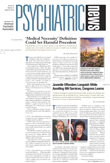The influence of politics in health care has altered the practice of medicine over the years. Physicians struggle to keep the reins of medicine in their hands. I have heard many physicians who have practiced medicine for decades talk with nostalgia about the simplicity that once surrounded the provision of patient care in this country.
To ensure that patients have access to the services they need and that these services are high quality, residents should begin their involvement in advocacy and related professional activities early. Organizations such as APA and the AMA provide education and opportunities to residents to become advocates for their profession and train them to be leaders. To be successful as advocates of our profession and patients, we need to understand issues concerning graduate medical education and national health policies. The AMA Resident and Fellow Section (AMA-RFS) has been successful at advocating for change in areas such as resident work hours, collective negotiations, resident contracts, working conditions, public health and safety, and resident representation within hospitals and on residency review committees.
In my last article (Psychiatric News, February 6), I introduced the AMA-RFS to readers and described briefly some of the important actions of the AMA House of Delegates at its interim meeting in December 2003.
The AMA held its annual meeting in June in Chicago (Psychiatric News, July 16). The AMA-RFS met two days prior to the meeting and discussed resolutions submitted by resident members; the resolutions then went on to the House of Delegates for adoption, amendment, or referral. These are some of the resolutions that might be of interest to you:
•
Fellowship application reform: The AMA voted to support, in cooperation with other specialty societies, the development of a standardized application and selection process for subspecialty training fellowships.
•
Obesity epidemic: The AMA approved a resolution recognizing that obesity is a health problem of epidemic proportions and that education regarding identification and prevention of obesity is appropriate.
•
Protection of patient privacy against federal judicial intrusion: The AMA voted to oppose intrusions on the physician-patient relationship and any requests by outside bodies for confidential patient medical records without a valid legal justification or without appropriate patient authorization.
•
Resident and fellow colleague intimidation: This resolution called on the AMA to conduct a confidential computerized survey of residents and fellows to determine the kinds of behaviors they find intimidating, levels of intimidation occurring, ways in which they handle intimidation, and overall prevalence of intimidation. The AMA was also asked to establish a central reporting venue for resident and colleague intimidation, encourage confidential reporting, establish a conflict-resolution process, and work with the ACGME to investigate residency programs with more than five reported incidences of intimidation by one attending or more than 20 total reported incidences of intimidation by all attendings. This resolution was referred to the AMA-RFS Governing Council.
•
Simplification of the state medical licensure process: The AMA voted to assign one or more appropriate individuals from within the AMA to work with the Federation of State Medical Boards (FSMB) and keep the AMA membership apprised of the FSMB's actions on developing a standardized medical licensure application.
Education was another important topic at the meeting. There were two breakout sessions on education at the June meeting: “Refining the Message and the Messenger” gave participants an opportunity to develop and enhance public speaking and communication skills. “The ABC's of Finding the Right Job for You and Negotiating Critical Terms in Your Physician Employment Agreement” provided participants with strategies and legal information on contract negotiation after residency.
During its meeting, the AMA-RFS announced several educational initiatives and projects, including the First Annual AMA-RFS Research Poster Symposium to be held at the 2004 interim meeting. The goal of the symposium is to encourage the sharing of professional research and knowledge at RFS meetings. More information is available by contacting the AMA's Department of Resident and Fellow Services at (800) 262-3211, ext. 4751.
The AMA-RFS has also worked with the Medical Student Section to develop an online catalog of international electives and foreign residency opportunities, now found at<www.ama-assn.org/ama/pub/category/12557.html>.
These are some of the topics on which you can find information on the Web site of the AMA-RFS:
•
Five Things Residents Need to Know Now
•
Tips to Survive Residency
•
International Health Opportunities/Foreign Residency Rotations
The AMA-RFS interim meeting will be held in December in Atlanta, and all residents are encouraged to attend. More information will be posted on the AMA's Web site at<www.ama-assn.org/go/rfs> when it becomes available.
Detailed descriptions of the resolutions noted above and other information about the June meeting of the Resident and Fellow Section is posted online at<www.ama-assn.org/ama/pub/category/15.html>.
More information on the AMA-RFS's activities or involvement in the section or organized medicine is available by calling (312) 464-4751 or e-mailing [email protected]. You are welcome to contact me at [email protected] if you would like to bring forth suggestions for resolutions or learn more about the role of the AMA-RFS in advocacy and education for residents. ▪

